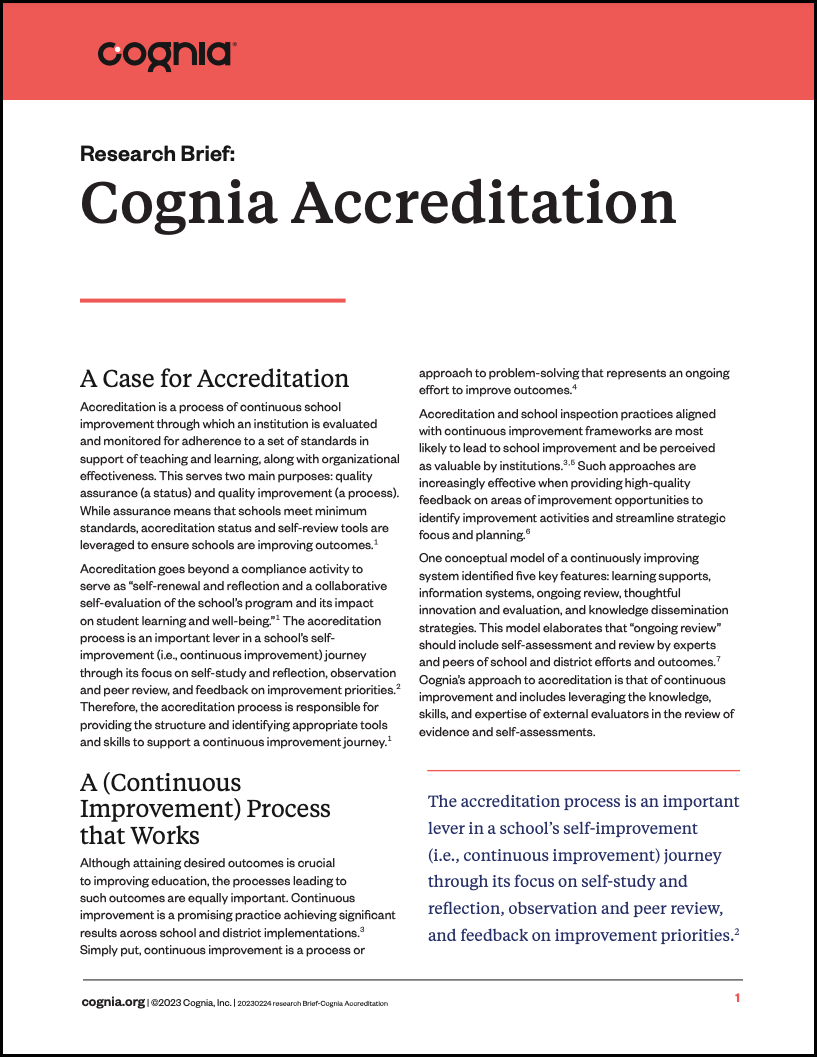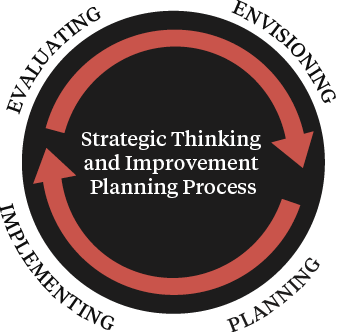In the following research brief, we outline key research related to the process of accreditation, Cognia’s unique approach, and findings related to improvement in Cognia-accredited schools. The brief describes research on the value of school accreditation, sometimes referred to as “school inspection,” and its relationship to school improvement, primarily through its emphasis on both self-reflection and third-party review. Further, it highlights research on continuous improvement models and continuously improving systems, which laid the groundwork for Cognia’s accreditation framework. The brief shares initial findings related to improvements and positive outcomes associated with participation in Cognia accreditation.
A Case for Accreditation
Accreditation is a process of continuous school improvement through which an institution is evaluated and monitored for adherence to a set of standards in support of teaching and learning, along with organizational effectiveness. This serves two main purposes: quality assurance (a status) and quality improvement (a process). While assurance means that schools meet minimum standards, accreditation status and self-review tools are leveraged to ensure schools are improving outcomes.1
Accreditation goes beyond a compliance activity to serve as “self-renewal and reflection and a collaborative self-evaluation of the school’s program and its impact on student learning and well-being.”1 The accreditation process is an important lever in a school’s self-improvement (i.e., continuous improvement) journey through its focus on self-study and reflection, observation and peer review, and feedback on improvement priorities.2 Therefore, the accreditation process is responsible for providing the structure and identifying appropriate tools and skills to support a continuous improvement journey.1
The accreditation process is an important lever in a school’s self-improvement (i.e., continuous improvement) journey through its focus on self-study and reflection, observation and peer review, and feedback on improvement priorities.
A (Continuous Improvement) Process that Works
Although attaining desired outcomes is crucial to improving education, the processes leading to such outcomes are equally important. Continuous improvement is a promising practice achieving significant results across school and district implementations.3 Simply put, continuous improvement is a process or approach to problem-solving that represents an ongoing effort to improve outcomes.4
Accreditation and school inspection practices aligned with continuous improvement frameworks are most likely to lead to school improvement and be perceived as valuable by institutions.3,5 Such approaches are increasingly effective when providing high-quality feedback on areas of improvement opportunities to identify improvement activities and streamline strategic focus and planning.6
 One conceptual model of a continuously improving system identified five key features: learning supports, information systems, ongoing review, thoughtful innovation and evaluation, and knowledge dissemination strategies. This model elaborates that “ongoing review” should include self-assessment and review by experts and peers of school and district efforts and outcomes.7 Cognia’s approach to accreditation is that of continuous improvement and leveraging the knowledge, skills, and expertise of external evaluators to review evidence compiled via self-assessment of such efforts and demonstration of outcomes.
One conceptual model of a continuously improving system identified five key features: learning supports, information systems, ongoing review, thoughtful innovation and evaluation, and knowledge dissemination strategies. This model elaborates that “ongoing review” should include self-assessment and review by experts and peers of school and district efforts and outcomes.7 Cognia’s approach to accreditation is that of continuous improvement and leveraging the knowledge, skills, and expertise of external evaluators to review evidence compiled via self-assessment of such efforts and demonstration of outcomes.
Note: While the accreditation review process is best aligned with the ongoing review feature of the continuous improvement model, all institutions accredited by Cognia also gain membership to an Improvement Network that provides tools, resources, and supports aligned with the four additional features: learning supports, information systems, thoughtful innovation and evaluation, and knowledge dissemination strategies. Therefore, Cognia accreditation embodies a full continuous improvement framework, beyond an external review.
Adding Value and Inspiring Change
Research on the effects of accreditation processes on desired outcomes is emergent and growing. Key findings currently establish the value of accreditation through stakeholder perceptions (e.g., surveys), particularly accreditation’s influence over improvement activities and systems thinking. Research shows that accreditation is seen as particularly valuable by stakeholders when emphasizing growth mindset and committee deliberation (e.g., collaboration).8 Additional studies have shown that schools both demonstrate improvement following accreditation and that schools participating in a systemic approach to accreditation outperform similar schools utilizing a non-systemic approach.9,10
While study into the effects of contemporary models of accreditation is ongoing, promising connections have been identified between school inspection (i.e., accreditation), school improvement, teacher behaviors, and implementation of improvement strategies for student conduct, achievement, and classroom management.11
Cognia’s continuous improvement-centered accreditation process uses research-based, regularly reviewed performance standards to emphasize quality and effective practices. Intentionally designed to be flexible in applying to the unique context of each institution, Cognia uses a systemic approach to school improvement. Research has shown that schools using a systemic process outperform comparable schools that do not implement systemic reforms. In a study of Michigan schools, schools leveraging AdvancED (now Cognia) accreditation were rated higher on school quality standards compared to similar schools. Further, when examining school performance rankings (i.e., Michigan’s Top-to-Bottom list), the schools’ mean rankings were higher than schools using a non-systemic approach in all categories except Focus schools, where the means were similar.10
The accreditation process can play a meaningful role in inspiring and influencing continuous improvement efforts.
The accreditation process can play a meaningful role in inspiring and influencing continuous improvement efforts. A study of 678 schools participating in Cognia’s (then AdvancED’s) accreditation process examined the degree of change in performance against each school quality standard. Additionally, participants were asked to rate the degree of influence of accreditation on said change. Across all variants of governance, location, and school type, respondents generally indicated “noticeable” to “significant” change in standards’ performance. Additionally, schools participating in accreditation voluntarily (i.e., not mandated by state law) identified the highest degree of accreditation’s influence on their improvements.11
Cognia’s continuous improvement approach to accreditation guides schools’ improvement efforts toward the areas of greatest need. When asked on which standards their school produced change after accreditation, study participants responded with the highest degree of change on standards they were rated lowest upon review. Their responses thereby indicated the accreditation process as a lever and motivator for specific areas of growth. Study participants also noted the process inspired and prompted whole-school reflection and encouraged ownership of improvement plans and priorities.11
| The accreditation process can play a meaningful role in inspiring and influencing continuous improvement efforts. A study of 678 schools participating in Cognia’s (then AdvancED’s) accreditation process examined the degree of change in performance against each school quality standard. Additionally, participants were asked to rate the degree of influence of accreditation on said change. Across all variants of governance, location, and school type, respondents generally indicated “noticeable” to “significant” change in standards’ performance. Additionally, schools participating in accreditation voluntarily (i.e., not mandated by state law) identified the highest degree of accreditation’s influence on their improvements.11
Cognia’s continuous improvement approach to accreditation guides schools’ improvement efforts toward the areas of greatest need. When asked on which standards their school produced change after accreditation, study participants responded with the highest degree of change on standards they were rated lowest upon review. Their responses thereby indicated the accreditation process as a lever and motivator for specific areas of growth. Study participants also noted the process inspired and prompted whole-school reflection and encouraged ownership of improvement plans and priorities.11 |
Cognia’s Strategic Thinking and Improvement Process
©2023 Cognia, Inc. |
References
1 Groves, B., & George, M. S. (2022). Connecting the dots of accreditation : leadership, coherence, and continuous improvement. Rowman & Littlefield Publishers. http://whel-primo.hosted.exlibrisgroup.com/openurl/44WHELF_NLW/44WHELF_NLW_services_page?u.ignore_date_coverage=true&rft.mms_id=993578806502419
2 Rothstein, R., Jacobsen, R, & Wilder, J. (2009). From Accreditation to Accountability, Phi Delta Kappan, 90:9, 624-629
3 Best, J., & Dunlap, A. (n.d.) Continuous Improvement in Schools and Districts: Policy Considerations. https://files.eric.ed.gov/fulltext/ED557599.pdf
4 American Society for Quality. (n.d.). Continuous improvement. Retrieved from http://asq.org/learn-about-quality/continuous-improvement/overview/overview.html
5 Wozniak, E. C. (2017). Independent school accreditation and the learning organization (Order No. 10620579). Available from ProQuest Dissertations & Theses Global. (1933343617). Retrieved from https://libproxy.library.unt.edu/login?url=https://www.proquest.com/dissertations-theses/independent-school-accreditation-learning/docview/1933343617/se-2
6 Ehren M., & Visscher, A. (2008) The Relationships Between School Inspections, School Characteristics And School Improvement, British Journal of Educational Studies, 56:2, 205-227, DOI: 10.1111/j.1467-8527.2008.00400.x
7 Darling-Hammond, L. and Plank, D. (2015). Supporting continuous improvement in California’s education system. Policy brief, Policy Analysis for California Education and Stanford Center for Opportunity Policy in Education.” http://edpolicyinca.org/sites/default/files/PACE%20Scope%20CCEE%20January%202015.pdf
8 Holland, C. T. (2019). A qualitative investigation of independent school educators’ lived experiences with PreK-12 accreditation (Order No. 13813900). Available from ProQuest Dissertations & Theses Global. (2209756103). Retrieved from https://libproxy.library.unt.edu/login?url=https://www.proquest.com/dissertations-theses/qualitative-investigation-independent-school/docview/2209756103/se-2
9 Ehren M., & Visscher, A. (2008) The Relationships Between School Inspections, School Characteristics And School Improvement, British Journal of Educational Studies, 56:2, 205-227, DOI: 10.1111/j.1467-8527.2008.00400.x
10 Fleming, D. P. (2018). AdvancED systemic process approach versus Michigan department of education non-systemic process approach to school improvement (Order No. 13857014). Available from ProQuest Dissertations & Theses Global. (2208433662). Retrieved from https://libproxy.library.unt.edu/login?url=https://www.proquest.com/dissertations-theses/advanced-systemic-process-approach-versus/docview/2208433662/se-2
11 AdvancED. (2009) Re: Learning from Accreditation. https://source.cognia.org/issue-article/self-study-impact-accreditation-school-improvement/
© Cognia Inc.
This article may be republished or reproduced in accordance with The Source Copyright Policy.
The information in this article is given to the reader with the understanding that neither the author nor Cognia is in engaged in rendering any legal or business advice to the user or general public. The views, thoughts, and opinions expressed in this article belong solely to the author(s), and do not necessarily reflect the official policy or position of Cognia, the author’s employer, organization, or other group or individual.


